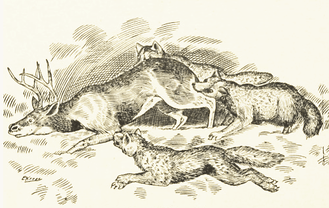Functional response
A functional response in ecology is the intake rate of a consumer as a function of food density (the amount of food available in a given ecotope). It is associated with the numerical response, which is the reproduction rate of a consumer as a function of food density. Following C. S. Holling, functional responses are generally classified into three types, which are called Holling's type I, II, and III.[1]

Type I
Type I functional response assumes a linear increase in intake rate with food density, either for all food densities, or only for food densities up to a maximum, beyond which the intake rate is constant. The linear increase assumes that the time needed by the consumer to process a food item is negligible, or that consuming food does not interfere with searching for food. A functional response of type I is used in the Lotka–Volterra predator–prey model. It was the first kind of functional response described and is also the simplest of the three functional responses currently detailed.
Type II
Type II functional response is characterized by a decelerating intake rate, which follows from the assumption that the consumer is limited by its capacity to process food. Type II functional response is often modeled by a rectangular hyperbola, for instance as by Holling's disc equation,[2] which assumes that processing of food and searching for food are mutually exclusive behaviors. The equation is

where f denotes intake rate and R denotes food (or resource) density. The rate at which the consumer encounters food items per unit of food density is called the attack rate, a. The average time spent on processing a food item is called the handling time, h. Similar equations are the Monod equation for the growth of microorganisms and the Michaelis–Menten equation for the rate of enzymatic reactions.
In an example with wolves and caribou, as the number of caribou increases while holding wolves constant, the number of caribou kills increases and then levels off. This is because the proportion of caribou killed per wolf decreases as caribou density increases. The higher the density of caribou, the smaller the proportion of caribou killed per wolf. Explained slightly differently, at very high caribou densities, wolves need very little time to find prey and spend almost all their time handling prey and very little time searching. Wolves are then satiated and the total number of caribou kills reaches a plateau.[3]
Type III
Type III functional response is similar to type II in that at high levels of prey density, saturation occurs. But now, at low prey density levels, the graphical relationship of number of prey consumed and the density of the prey population is a more than linearly increasing function of prey consumed by predators. This accelerating function is largely descriptive, and often justified by learning time, prey switching, or a combination of both phenomena, but the type III functional response lacks the rigorous theoretical underpinning of the type II functional response.
Learning time is defined as the natural improvement of a predator's searching and attacking efficiency or the natural improvement in their handling efficiency as prey density increases. Imagine a prey density so small that the chance of a predator encountering that prey is extremely low. Because the predator finds prey so infrequently, it has not had enough experience to develop the best ways to capture and subdue that species of prey. Holling identified this mechanism in shrews and deer mice feeding on sawflies. At low numbers of sawfly cocoons per acre, deer mice especially experienced exponential growth in terms of the number of cocoons consumed per individual as the density of cocoons increased. The characteristic saturation point of the type III functional response was also observed in the deer mice. At a certain density of cocoons per acre, the consumption rate of the deer mice reached a saturation amount as the cocoon density continued to increase.[2]
Prey switching involves two or more prey species and one predator species. When all prey species are at equal prey densities, the predator will indiscriminately select between prey species. However, if the density of one of the prey species decreases, then the predator will start selecting the other, more common prey species with a higher frequency. Murdoch demonstrated this effect with guppy preying on tubificids and fruit flies. As fruit fly numbers decreased guppies switched from feeding on the fruit flies on the water's surface to feeding on the more abundant tubificids along the bed.[4]
References
- Holling, C. S. (May 1959). "The components of predation as revealed by a study of small-mammal predation of the European pine sawfly". The Canadian Entomologist. 91 (5): 293–320. doi:10.4039/Ent91293-5.
- Holling, C. S. (July 1959). "Some characteristics of simple types of predation and parasitism". The Canadian Entomologist. 91 (7): 385–98. doi:10.4039/Ent91385-7.
- Dale, Bruce W.; Adams, Layne G.; Bowyer, R. Terry (1994). "Functional Response of Wolves Preying on Barren-Ground Caribou in a Multiple-Prey Ecosystem". Journal of Animal Ecology. 63: 644–652.
- Murdoch, William W. (1977). "Stabilizing effects of spatial heterogeneity in predator-prey systems". Theoretical Population Biology. 11: 252–73.